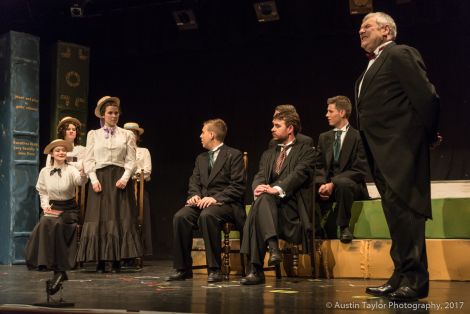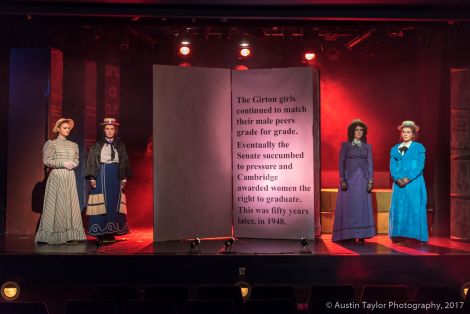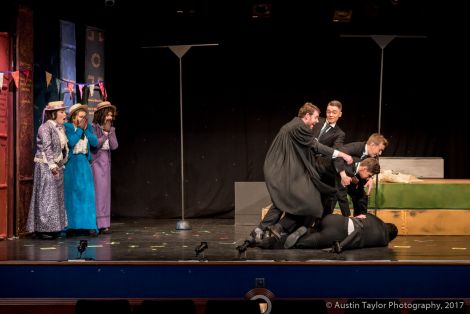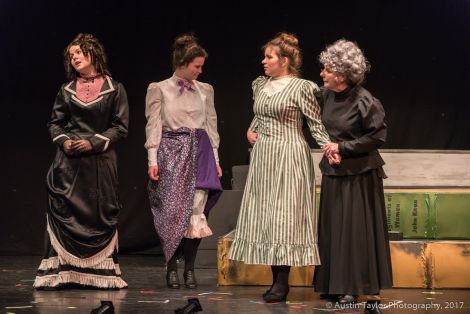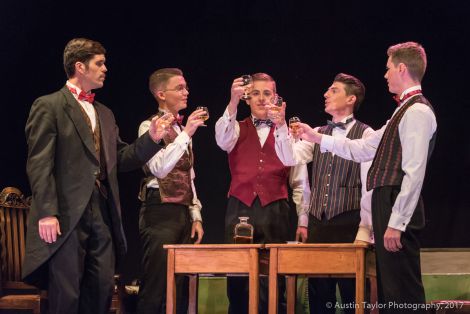Reviews / Theatre review: ‘Love or education. What do you do when you can’t have both?’
THIS November, Islesburgh Drama Group ventured into the past to uncover the fight a group of Cambridge girls faced in 1896 to graduate from university.
Jessica’s Swale’s debut play Blue Stockings, first performed at The Globe in 2013, deals with the injustices women faced in endeavouring to educate themselves to the same standards as their male counterparts.
Built around the story of four girls, Swale’s play exposes the prevailing views men, and women, had of educated females at the time, as well as exploring the themes of love and marriage, friendship and suffrage.
Directed and produced by Stephenie Pagulayan, Blue Stockings focuses on the point at which a long-fought campaign to allow girls graduation privileges came to a head; the decision as to whether or not this should be permitted lying firmly in the hands of a group of male voters.
The play itself, while for the most part serious in its treatment of historic barriers women have faced, was not without its lighter moments. However, much of the humour was delivered only through Swales’ inclusion of male views of women, which, while laughable now, were very much a real problem for the girls attending university at the turn of the previous century.
A stellar debut performance from Sula Brookes as Tess Moffat, an outspoken, lively girl with a genuine will to succeed, brought home the reality these girls faced in being forced to choose between love or knowledge.
Juliet Mullay shone as the gregarious Carolyn Addison, while Lydia Hay’s sensitive portrayal of a young woman desperate to educate herself struck a chord as her dreams were dashed by tragic family circumstances.
Cara Leask as Celia Willbond was equally convincing in playing the part of a supportive friend who recognised the precarious situation a girl could find herself in when presented with the opportunity to succeed in either love or education.
Become a member of Shetland News
Of course, a play about such a tumultuous time for women would not be complete without the villainous tribe of males forming the opposition. Reece Paul, certainly the most villainous of them all, delivered a consistently pompous performance as Lloyd whereas Sonny Thomason’s character Edwards added a good dose of humour to the production.
Martin Summers, as the love-struck childhood friend to Tess Moffat, was suitably endearing in his role as he reminded the audience of the difficult position a man could find himself in should he be seen to support or condone the campaign the women undertook.
This was further exemplified by Cameron Mackenzie’s heart-warming portrayal of Mr Banks, who took it upon himself to help the girls succeed despite being frowned upon by his university seniors.
Period dramas always present the added layer of the need for convincing costume and set design. Pagulayan’s decision to stage the whole performance in a semi-stylised fashion with a set that consisted mainly of oversized academic-looking books meant that the considerable scene changes written into the play by Swale went as smoothly as possible.
Some scenes in the play were particularly short, meaning that it became essential for what was a very competent and efficient stage crew to move swiftly. Pagulayan’s use of key furniture and props to indicate setting minimised the disruptions as much as possible, but nonetheless the transitions tended to draw the audience’s attention to them.
However, by the same token, the constant presence of towering books did not distract the audience from focusing on the relationships between characters, but rather ensured they did not forget the fundamental issues of education at the heart of the play.
The set design also made good use of lighting; a beautiful draped backdrop of stars for night-time scenes, that shimmered with leaves for orchard scenes created a suitably dusky ambience.
Fitting into Pagulayan’s stylised approach was her decision to light up key cast members during poignant or noteworthy monologues. This was particularly striking in the dramatic closing scene when the four lead girls revealed the extent of the struggle they faced through text, cleverly written on the inside of one of the oversized set books. This lent itself to a particularly memorable conclusion.
On the whole, Blue Stockings was beautifully handled. A young cast taking on such principal theatrical roles, supported by such an experienced, witty and wonderful more senior cast, was brilliant to see.
As much as Blue Stockings gave a full-house audience a bite of history, so it reminded us that many of our freedoms and privileges were hard-fought and not easily-won. Long live community theatre when it delivers lessons such as these.
Helen Kerr
Become a member of Shetland News
Shetland News is asking its readers to consider paying for membership to get additional perks:
- Removal of third-party ads;
- Bookmark posts to read later;
- Exclusive curated weekly newsletter;
- Hide membership messages;
- Comments open for discussion.
If you appreciate what we do and feel strongly about impartial local journalism, then please become a member of Shetland News by either making a single payment, or setting up a monthly, quarterly or yearly subscription.




